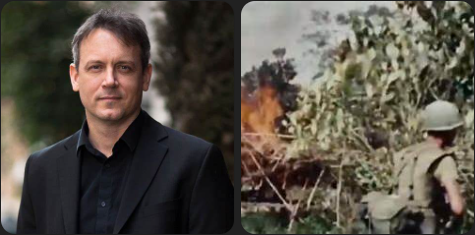Turning Point: Five Imperatives for Engaging with Brian Knappenberger’s Vietnam War Docuseries on Netflix
Introduction
Netflix’s continual evolution of the documentary form culminates in the release of “Turning Point: The Vietnam War”, a meticulously crafted and emotionally resonant series directed by the award-winning documentarian Brian Knappenberger. Revered for his incisive interrogations of complex socio-political events, Knappenberger brings a sophisticated and humane lens to one of the twentieth century’s most polarizing conflicts. His methodological precision and commitment to narrative ethics distinguish this series as a landmark in both historical filmmaking and critical memory studies.
Structured as a five-part docuseries, Turning Point immerses viewers in the intricate realities of the Vietnam War through an expansive archive of declassified intelligence, contemporaneous broadcasts and first-person Vietnamese testimonies—perspectives often marginalized in conventional Western narratives. Released at a moment of resurgent debates about American global conduct and accountability, the series offers a critical intervention into the politics of memory and the construction of historical truth. It does more than document the past; it interrogates it, creating a space for ethical reflection, historical reckoning, and transnational dialogue.
1. The Auteur Behind the Lens: Knappenberger’s Critical Documentary Praxis
Brian Knappenberger’s oeuvre has consistently blended investigative journalism, narrative complexity, and human rights advocacy. Known for The Internet’s Own Boy and Turning Point: 9/11 and the War on Terror, Knappenberger brings to his Vietnam War project an interdisciplinary sensibility that transcends simplistic recounting.
His signature hallmarks include:
- Deep critique of institutional dysfunction and state opacity
- Synthesis of personal testimony with structural historical analysis
- Reliance on authenticated archival sources
- Commitment to decolonial and ethically responsible storytelling
By foregrounding underrepresented perspectives and critically examining systems of power, Knappenberger reframes the Vietnam War not as a closed historical episode but as a site of ongoing epistemic contestation.
2. Methodological Distinctions: A New Paradigm in Vietnam War Historiography
While many documentaries have explored the Vietnam War, few exhibit the intellectual rigor and narrative multidimensionality of Turning Point. What sets this docuseries apart is not just what it reveals, but how it constructs knowledge:
- Declassified U.S. Government Memoranda: Confidential communications now publicly accessible, enabling a forensic reconstruction of wartime policymaking.
- Restored CBS Broadcast Archives: Historical broadcasts recontextualized as living documents of influence and resistance.
- Vietnamese Eyewitness Narratives: Voices from both North and South Vietnam are integrated with minimal editorial filtration.
- Presidential and White House Transcripts: High-level dialogues provide granular insight into strategic rationalizations under extreme pressure.
Rather than privileging battlefield tactics or military maneuvers, the series positions war within interlocking domains of culture, psychology, media, and diplomacy—elevating the discourse from descriptive to analytical.

3. Critical Inquiries: Reframing the Historical Discourse
✨ What catalyzed the Vietnam War?
Rejecting monolithic Cold War binaries, the series tracks the war’s origins to the collapse of French Indochina and America’s ideological and strategic positioning during the early Cold War. Through diplomatic communiqués, intelligence briefings, and public rhetoric, it unpacks the complex causality leading to direct U.S. intervention.
✨ How did the war shape American civil society?
The domestic reverberations of the Vietnam War are analyzed with exceptional clarity. Interwoven narratives trace the rise of anti-war activism, the moral tensions within the civil rights movement, and the emergence of youth-led counterculture. The war becomes a lens through which to view a democracy under internal strain, with mass media acting as both mediator and amplifier.
✨ What are the enduring legacies of the conflict?
The series underscores the Vietnam War’s residual impact on subsequent military interventions, veteran care policy, and the erosion of public faith in government. It connects the conflict to later U.S. engagements in Iraq and Afghanistan, suggesting an ideological continuity shaped by unexamined trauma and institutional inertia.
4. The Architecture of Emotion: Rendering the War’s Human Cost
Knappenberger’s epistemological commitment extends to affective truths. He refuses to dissociate empirical analysis from human suffering. This results in a layered portrayal of war that is as emotionally illuminating as it is intellectually demanding:
- Civilian Displacement and Devastation: Vietnamese survivors recount personal histories of loss and endurance.
- Veterans’ Testimonies: Soldiers from both sides offer introspections that complicate binary constructions of heroism and guilt.
- Journalistic Risk-Taking: War correspondents speak candidly about the ethical stakes of documenting atrocity.
- Activist Consciousness: Protest leaders articulate the moral calculus that drove their resistance.
These testimonies coalesce into a textured moral landscape, making the war’s cost not just legible but deeply felt.
5. Relevance in the Present: A Vital Text for a Fractured Age
In a world besieged by revisionist histories and ideological extremism, Turning Point: The Vietnam War offers a vital corrective. Its interpretive ambition and archival depth make it an essential contribution to contemporary historical consciousness.
The series draws unmistakable parallels between the Cold War’s proxy conflicts and today’s global entanglements, inviting reflection on militarism, media manipulation, and ethical citizenship. It functions as both history and warning, urging audiences to act with informed vigilance in the face of present-day crises.
Cultural Reception and Metrics
- Global Release: April 2025 on Netflix
- Format: Five feature-length episodes (60–75 minutes each)
- Source Material: Over 20 years of archival records
- Interviewees: 30+ individuals, including diplomats, activists, veterans, and journalists
- Audience Score: 8.7/10 on IMDb within the first week
These indicators affirm the series’ scholarly and popular resonance.
Frequently Asked Questions (FAQs)
Q1: How many episodes does the series include?
A1: Five episodes, each between 60 and 75 minutes in length.
Q2: Is the series appropriate for academic use?
A2: Yes. Its critical frameworks and primary sources make it highly suitable for courses in history, political science, international relations, and media studies.
Q3: Is the series politically biased?
A3: No. It critiques specific policies while maintaining a balanced and source-driven perspective.
Q4: Is it accessible to international audiences?
A4: Yes. The inclusion of global and especially Vietnamese viewpoints enhances its cross-cultural intelligibility.
Q5: Where is the series available for viewing?
A5: Exclusively on Netflix across participating regions.

Conclusion
Brian Knappenberger’s Turning Point: The Vietnam War redefines historical documentary by marrying scholarly precision with emotional resonance. Its layered approach illuminates not just what happened, but why it matters—now more than ever.
In a media landscape awash with superficiality and distortion, this docuseries stands as a beacon of critical engagement. For educators, students, historians, and engaged citizens, it is an indispensable text—one that transforms passive viewing into active remembrance.
Engage with it deeply.
Meta Description
Explore Brian Knappenberger’s revelatory Netflix docuseries on the Vietnam War. Across five powerful episodes, discover rarely seen footage, declassified documents, and deeply human stories that redefine our understanding of conflict and conscience.
Tags
Top Tags:
Vietnam War Documentary, Brian Knappenberger, Netflix Docuseries, Turning Point Series, Historical Documentaries, U.S. War History, Cold War Conflicts, Netflix New Releases, Political Documentaries, Archival Footage Series
Longtail Tags:
Brian Knappenberger Vietnam War Netflix, Turning Point Vietnam War review, Vietnam War docuseries Netflix episodes, Vietnam War storytelling perspectives, Netflix historical docuseries 2025
Strategic Recommendations
- Adopt Multi-Layered Narratives: Combine thematic, chronological, and personal storytelling.
- Utilize Semantic SEO Practices: Embed LSI keywords and structured metadata.
- Incorporate Academic Validation: Highlight endorsements or references from scholars and journalists.
- Encourage Cross-Linking: Guide readers to related content for deeper engagement.
- Visual Supplementation: Employ infographics to distill complex timelines and data points.
